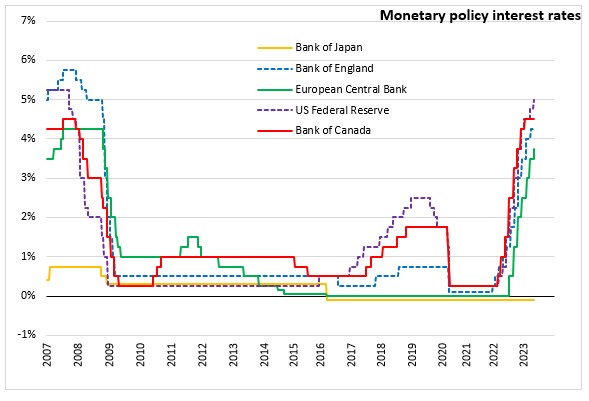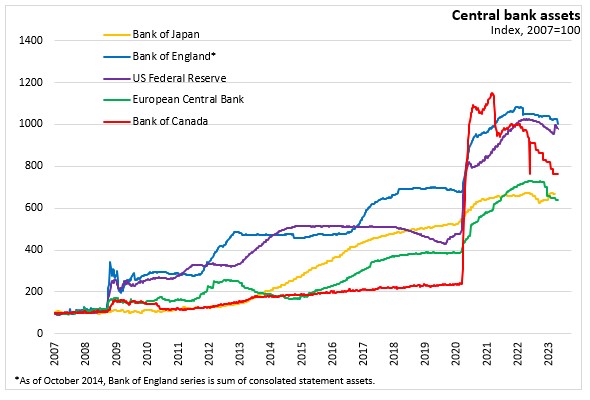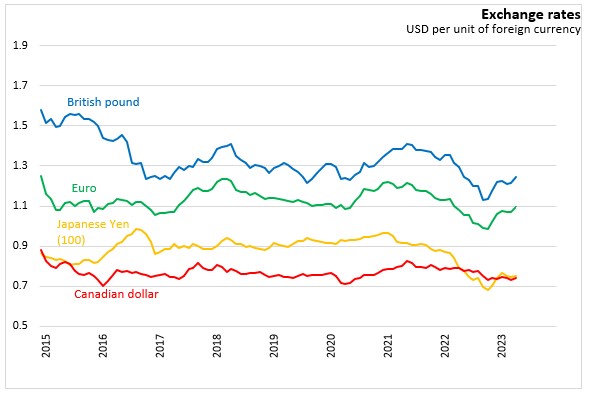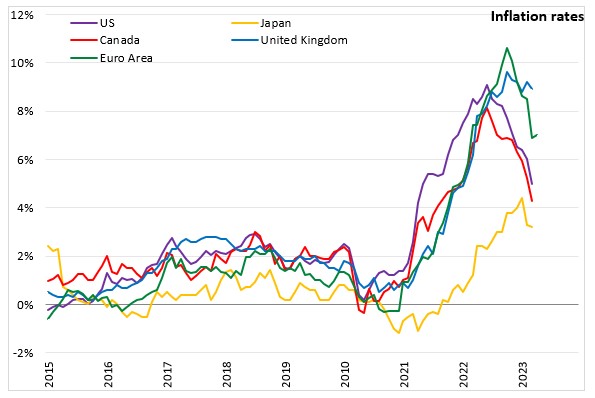The Economics and Statistics Division maintains archives of previous publications for accountability purposes, but makes no updates to keep these documents current with the latest data revisions from Statistics Canada. As a result, information in older documents may not be accurate. Please exercise caution when referring to older documents. For the latest information and historical data, please contact the individual listed to the right.
<--- Return to Archive
For additional information relating to this article, please contact:
May 04, 2023EUROPEAN CENTRAL BANK MONETARY POLICY The European Central Bank (ECB) raised the three key ECB interest rates by 25 basis points as the inflation outlook continues to be too high for too long. The interest rate on the main refinancing operations, the interest rates on the marginal lending facility and the deposit facility will be increased to 3.75%, 4.00% and 3.25% respectively, effective 10 May 2023.
As announced in the February Monetary Policy Meeting, the asset purchase programme (APP) portfolio is declining at a measured and predictable pace, as the Eurosystem does not reinvest all principal payments from maturing securities. The decline will amount to €15 billion per month on average until the end of June 2023 and the Governing Council expects to discontinue the reinvestments under the APP as of July 2023.
The Governing Council intends to reinvest the principal payments from maturing securities purchased under the pandemic emergency purchase programme (PEPP) until at least the end of 2024. The Governing Council noted that the future roll-off of the PEPP portfolio will be managed to avoid interference with the appropriate monetary policy stance.
According to Eurostat’s preliminary flash estimate, the euro area economy grew by 0.1% in the first quarter of 2023. While private domestic demand remained weak, lower energy prices, easing of supply bottlenecks and fiscal policy support for households and businesses have contributed to the growth in the first quarter. Business and consumer confidence have recovered in recent months but remain weaker than before Russia's invasion of Ukraine.
Household income is being supported by strong labour markets. The unemployment rate fall to a new historical low of 6.5% in March 2023 with total hours worked exceeding pre-pandemic levels.
According to Eurostat’s flash estimate, inflation was 7.0% in April following a drop from 8.5% in February to 6.9% in March 2023. Food price inflation remains elevated standing at 13.6% in April, after 15.5% in March. Price pressures remain strong, partly because high energy costs are spreading throughout the economy. The pent-up demand from the reopening of the economy and higher wages are also pushing up inflation in the services sector. The Governing Council noted that as the energy crisis fades, governments should roll back the related support measures promptly and in a concerted manner to avoid driving up medium-term inflationary pressures, which would call for a stronger monetary policy response.
The Governing Council noted that future decisions will ensure that the policy rates will be brought to levels sufficiently restrictive to achieve a timely return of inflation to the 2% medium-term target and will be kept at those levels for as long as necessary. Future policy rate decisions will be based on a data-dependent approach and its assessment of the inflation outlook in light of the incoming economic and financial data, the dynamics of underlying inflation, and the strength of monetary policy transmission.
The next scheduled monetary policy meeting will be on June 15, 2023. An updated summary of economic projections is also expected to be published in June 2023.




Source: European Central Bank: Monetary Policy Decisions, Monetary Policy Statement (Press Conference)
<--- Return to Archive